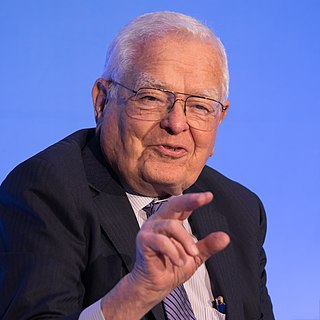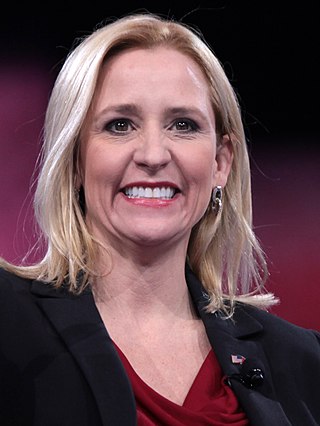Related Research Articles
Earthjustice is a nonprofit public interest organization based in the United States dedicated to litigating environmental issues. Headquartered in San Francisco, they have an international program, a communications team, and a policy and legislation team in Washington, D.C., along with 14 regional offices across the United States.

Roy Rudolf Romer is an American politician who served as the 39th Governor of Colorado from 1987 to 1999, and subsequently as the superintendent of the Los Angeles Unified School District from 2000 to 2006.
James C. Nelson is a retired American attorney and jurist who served as an associate justice of the Montana Supreme Court from 1993 through 2012, having been appointed to the court by Republican Governor Marc Racicot in May 1993.

Amendment 41 is a citizen initiative adopted by Colorado voters in the 2006 general election. Amendment 41 has three main sections.

Thomas Charles Horne is an American politician, attorney, businessman, and activist who has served as the Arizona Superintendent of Public Instruction since 2023 and previously from 2003 to 2011. A Republican, he also served as the 25th Attorney General of Arizona from 2011 to 2015. Horne ran for reelection as Attorney General but lost to Mark Brnovich in the 2014 Republican primary. Horne was elected to another term as Superintendent of Public Instruction in 2022.
James Bopp Jr. is an American conservative lawyer. He is most known for his work associated with election laws, anti-abortion model legislation, and campaign finance.
Same-sex marriage has been legally recognized in Colorado since October 7, 2014. Colorado's state constitutional ban on same-sex marriage was struck down in state district court on July 9, 2014, and by the U.S. District Court for the District of Colorado on July 23, 2014. The Tenth Circuit Court of Appeals had already made similar rulings with respect to such bans in Utah on June 25 and Oklahoma on July 18, which are binding precedents on courts in Colorado. On October 6, 2014, the U.S. Supreme Court declined to hear the Tenth Circuit cases, and the Tenth Circuit lifted its stay. On October 7, 2014, the Colorado Supreme Court and the Tenth Circuit cleared the way for same-sex marriages to begin in Colorado.
Citizens United v. Federal Election Commission, 558 U.S. 310 (2010), is a landmark decision of the Supreme Court of the United States regarding campaign finance laws and free speech under the First Amendment to the U.S. Constitution. The court held 5–4 that the freedom of speech clause of the First Amendment prohibits the government from restricting independent expenditures for political campaigns by corporations, including nonprofit corporations, labor unions, and other associations.
Same-sex marriage has been recognized in Montana since a federal district court ruled the state's ban on same-sex marriage unconstitutional on November 19, 2014. Montana had previously denied marriage rights to same-sex couples by statute since 1997 and in its State Constitution since 2004. The state appealed the ruling to the Ninth Circuit Court of Appeals, but before that court could hear the case, the U.S. Supreme Court struck down all same-sex marriage bans in the country in Obergefell v. Hodges, mooting any remaining appeals.

Stephen Clark Bullock is an American politician and lawyer who served as the 24th governor of Montana from 2013 to 2021. He is a member of the Democratic Party.
Jason Priest is an American businessman and former politician. A member of the Republican Party, he served in the Montana Legislature, representing Senate District 30 from 2011 to 2015.

Climate change has had a number of impacts on the US state of Montana. Heat waves are becoming more common, snow is melting earlier in the spring, and trees are dying as a result of drought, forest fire, and increased prevalence of forest insects. In the next few decades in Montana, climate change is most likely to impact water availability, agricultural yields, and wildfire risk. State and local governments have taken legislative steps, such as establishing a renewable energy portfolio and creating climate action plans, to mitigate the effects of climate change.
American Tradition Partnership, Inc. v. Bullock, 2011 MT 328, is a decision by the Montana Supreme Court ruling that the broad free speech protections given to corporations in Citizens United v. FEC do not apply to Montana's campaign finance laws. The United States Supreme Court reversed the Montana Supreme Court's decision in American Tradition Partnership, Inc. v. Bullock, 567, U.S. 516 (2012), in a short, per curiam opinion issued without oral argument. The court wrote only that the legal issue had already been precluded by Citizens United, and this case offered no new arguments and failed to distinguish that prior decision.

Patrick James Morrisey is an American politician and attorney serving as the 34th Attorney General of West Virginia since 2013. He is a member of the Republican Party.

Leslie Carol Rutledge is an American attorney and politician from the state of Arkansas. A member of the Republican Party, she was attorney general of Arkansas from 2015 to 2023, and since 2023 has been lieutenant governor of Arkansas.
The Montana Green Party is a state-level political party affiliated with the Green Party of the United States. It formed in 2001–2002 following Ralph Nader's run for president in 2000 as the Green Party nominee.
Dirk M. Sandefur is an associate justice of the Montana Supreme Court. His term began on January 2, 2017. He served for eight years as a criminal and civil Deputy Attorney for Cascade County, Montana, before being elected a judge on the 8th Judicial District of the Montana District Court in 2002. He ran for and won election to the Montana Supreme Court in 2016.

Montana District Courts are the state trial courts of general jurisdiction in the U.S. state of Montana. Montana District Courts have original jurisdiction over most civil cases, civil actions involving monetary claims against the state, criminal felony cases, naturalization proceedings, probate cases, and most writs. They may also hear certain special actions and proceedings, and oversee a narrowly-defined class of ballot issues. Montana District Courts also have limited appellate jurisdiction regarding cases that arise in Justice Courts, City Courts, and Municipal Courts as well as Judicial review of decisions by state administrative law tribunals that fall under the Montana Administrative Procedures Act.

Dark Money is a 2018 American documentary film directed by Kimberly Reed about the effects of corporate money and influence in the American political system. The film uses Reed's home state of Montana as a primary case study to advance a broader, national discussion on governance in an era of super PACs and Citizens United. Dark Money premiered at the 2018 Sundance Film Festival and premiered to a Montana audience at the Big Sky Film Festival in February 2018. The broadcast rights to Dark Money were purchased by PBS distribution to air the film as part of their docu-series POV in 2018.

Climate change litigation, also known as climate litigation, is an emerging body of environmental law using legal practice to set case law precedent to further climate change mitigation efforts from public institutions, such as governments and companies. In the face of slow politics of climate change delaying climate change mitigation, activists and lawyers have increased efforts to use national and international judiciary systems to advance the effort. Climate litigation typically engages in one of five types of legal claims: Constitutional law, administrative law, private law (challenging corporations or other organizations for negligence, nuisance, etc., fraud or consumer protection, or human rights.
References
- 1 2 Mission, Western Tradition Partnership Archived 2 July 2015 at the Wayback Machine
- 1 2 3 4 Sturgis, Sue (31 October 2011). "Special Investigation: Who's behind the 'information attacks' on climate scientists?". Free Range Longmont.
- ↑ "History and Documents (Corporations)". Colorado Secretary of State. Archived from the original on 14 October 2018. Retrieved 21 November 2011.
20081173078
- ↑ "E & E Legal Institute". Archived from the original on 12 February 2015. Retrieved 9 February 2015.
- ↑ Johnson, Charles S. (6 April 2014). "American Tradition Partnership Is Back". Independent Record.
- ↑ Williams, David O. (31 March 2010). "Western Tradition Partnership targets Salazar on alleged monument memo". The Colorado Independent.
- ↑ Petition Opposing Cap-and-Trade, Western Tradition Partnership Archived 28 July 2011 at the Wayback Machine
- ↑ Hooper, Troy (8 October 2010). "Attack mailer labels Snowmass senator 'The Appropriator'". Real Aspen.
- ↑ "Sen. Schwartz Targeted In Mailing For Her Utility Vote". State Bill Colorado. 4 October 2010. Archived from the original on 6 October 2010. Retrieved 11 January 2011.
- 1 2 3 4 Gouras, Matt (31 October 2010). "Battle intensifies over Montana law". The Spokesman Review.
- 1 2 3 Person, Daniel (22 October 2010). "Opinion meant to 'score political points,' WTP says". Bozeman Daily Chronicle.
- ↑ "Conservative groups sue over campaign finance law". Bozeman Daily Chronicle. 23 November 2010.
- ↑ Malby, Andy (19 October 2010). "Court tosses ban on corporate donations". Belgrade News.
- ↑ Bank, Marnee (18 October 2010). "Montana Politics 2010: Corporate Spending". KXLH.
- ↑ Johnson, Charles S. (18 October 2010). "Judge overturns Montana's 1912 ban on corporate campaign contributions". Ravalli Republic.
- ↑ In the Supreme Court of the State of Montana: Western Tradition Partnership, Inc. v. Attorney General of the State of Montana
- ↑ "American Tradition Partnership, Inc. v. Bullock". SCOTUSblog.
- 1 2 Dodge, Jefferson (29 October 2010). "Montana-based org. pours cash into conservative coffers in Longmont City Council race". The Boulder Weekly. Archived from the original on 20 November 2010. Retrieved 11 January 2011.
- ↑ Carter, Rachel (6 January 2010). "Longmont campaign finance suit over". The Longmont Times-Call.
- ↑ Atkin, Emily. "This Lawyer's New Job Is Defending Climate Scientists From Political Attacks". ThinkProgress . Archived from the original on 11 November 2014. Retrieved 11 November 2014.
- ↑ Western Tradition Partnership, Inc. v. Attorney General of Montana, 2011 MT 328
- ↑ "American Tradition Partnership". Archived from the original on 29 May 2012. Retrieved 30 May 2012.
- ↑ Dennison, Mike (4 January 2013). "Director of shadowy political group ATP resigns; group faces more legal troubles". Billings Gazette .
- ↑ Batheja, Aman (23 February 2014). "Stockman Campaign Denies It Was Behind Mailer". The Texas Tribune .
- 1 2 Barker, Kim; Young, Rick; Schwartz, Emma (30 October 2012). "Documents Found in Meth House Reveal Workings of Dark Money Group". The Atlantic.
- ↑ Ferguson, Donald (20 December 2012). "Judge orders COPP to turn over stolen ATP materials, slams State for improper conduct". ATP. Archived from the original on 11 November 2014. Retrieved 11 November 2014.